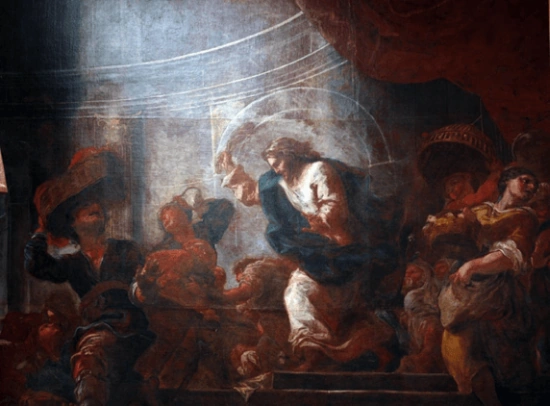
After Palm Sunday, on Monday, Jesus - having spent the night outside the city, re-enters Jerusalem, goes to the temple, and drives out the moneychangers and people who were selling animals for sacrifices. He overturns tables, and takes a whip, and uses it to clean out the temple. (See Mark 11:15-18.)
It's a powerful story. This is a different side of Jesus's personality than the gentle healer or patient teacher in so many stories.
On the face of it, it doesn't seem all that unreasonable for there to be moneychangers in the temple - a little like the bureaux de change at airports. Too, it seems convenient to have people there selling animals to those who need them for the prescribed sacrificial offerings.
So, what's the story about? Why this zealous scourging?
Because... the moneychangers and sellers of animals represent evil loves in our lives that cloak themselves in external piety. They have to be driven out, unmasked, and scourged. See Apocalypse Explained 410[8].
The evils are bad. The cloaking adds an extra layer of corruption that's even more objectionable. If you pretend that you're good, in order to enrich yourself, or empower yourself in some way -- that's a really insidious thing. It's terrible when people fake being good and then take advantage of their targeted victims, in fraud, or selling bad products, or stealing, or trafficking.
The temple was supposed to be a holy place of worship. On an external level, it had been infested by people who were faking piety, and taking advantage of the people who were actually pious, coming to worship there. It's a lot like the frauds who trafficked in fake Christian relics - splinters of the true cross, and the like, or more modern "Christian" televangelists who have - in some cases - turned out to have feet of clay.
When we see those behaviors uncloaked today, we can recognize them as being things that need to be scourged. But... what are the moneychangers in our own lives? Do we ever pretend to be pious so we can advance some evil love?
This is not an easy question. How well, and how fairly, do we know our own minds? One thing is that we have to understand the difference between simulation and hypocrisy -- see this article: Hypocrisy or Simulating.
But... when we've experienced Palm Sunday stages in our minds, when we're feeling inspired and filled with confidence in the Lord, it's a good day to go scourge our inner temple -- to see what surface pieties are there cloaking stealthy loves of evil -- and to overturn them and drive them out.







